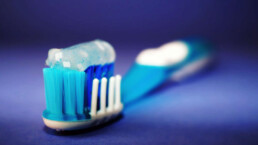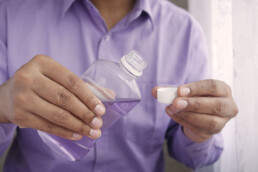


Post Operative Information
Post-operative care is very important after surgery. Unnecessary pain and the complications of infection and swelling can be minimised if the instructions are followed carefully.
Surgical Extractions
Immediately Following Surgery
- The gauze pad placed over the surgical area should be kept in place for half an hour.
- Avoid vigorous mouth rinsing or touching the wound area. This may dislodge the blood clot and initiate bleeding.
- Take the prescribed pain medications as soon as you begin to feel discomfort.
- Strict sinus precautions for two weeks – no nose blowing or drinking through a straw.
- Restrict your activities the day of surgery and resume normal activity when you feel comfortable.
- Place ice packs on the sides of your face to minimise swelling.
- You can brush your teeth the night of surgery but rinse gently. The day after surgery you should begin rinsing with the mouthwash prescribed 5-6 times a day, especially after eating. Alternatively, you can rinse with a cup of warm water mixed with a teaspoon of salt.
Bleeding
A certain amount of bleeding is to be expected following surgery. Slight bleeding, oozing, or redness in the saliva is not uncommon. To minimise bleeding, sit upright and avoid exercise. Excessive bleeding may be controlled by placing a gauze pad over the area and biting firmly for thirty minutes, repeating if necessary. If bleeding does not subside, call for further instructions.
Swelling
Swelling around the mouth, cheeks, eyes and sides of the face is a normal reaction to surgery. Swelling will not reach its maximum until 2-3 days post-operatively. To minimise swelling, immediately use ice packs after surgery. These should be left on continuously while you are awake. After 36 hours the ice has no beneficial effect. If swelling or jaw stiffness persists for several days, there is no cause for alarm. Thirty-six hours following surgery, the application of moist heat to the sides of the face can help reduce the size of the swelling.
Pain
Regular Paracetamol + Ibuprofen (if not contraindicated) is key to pain control. If you have been prescribed Panadeine forte do not take Panadol at the same time so as not to take too much Panadol.
For severe pain, take the tablets prescribed as directed. The prescribed pain medicine will make you groggy and will slow down your reflexes. Do not drive an automobile or work around machinery. Avoid alcoholic beverages. Pain or discomfort following surgery should subside more and more every day. If pain persists, it may require attention and you should call the office.
Bruising
In some cases, discolouration and bruising of the skin follows swelling. This is a normal post-operative occurrence, which may occur 2-3 days post-operatively. Moist heat applied to the area may speed up the removal of the discolouration.
Diet
After general anaesthetic or I.V. sedation, liquids should be initially taken. Do not use straws as the sucking motion can cause more bleeding by dislodging the blood clot. A soft diet is recommended and you should chew away from the surgical sites. Suggestions include – scrambled eggs, soup, pasta, mashed potato, ice cream, jelly, smoothies. Prevent dehydration by taking fluids regularly, at least 5-6 glasses of liquid should be taken daily. You will feel better, have more strength, less discomfort and heal faster if you continue to eat.
Antibiotics
If you have been prescribed antibiotics, take the tablets or liquid as directed. Antibiotics will be given to help prevent infection. Discontinue antibiotic use in the event of a rash or other unfavourable reaction. Call the office if you have any questions.
Nausea and Vomiting
In the event of nausea and/or vomiting following surgery, do not take anything by mouth for at least an hour including the prescribed medicine. You should then sip on coke, tea, or ginger ale. You should sip slowly over a fifteen-minute period. When the nausea subsides you can begin taking solid foods and the prescribed medicine.
Other Complications
- If numbness of the lip, chin, or tongue occurs there is no cause for alarm. As stated before surgery, this is usually temporary in nature. Be careful because if your lip or tongue is numb, you could bite it and not feel the sensation.
- Slight elevation of temperature immediately following surgery is not uncommon. If the temperature persists, notify the office.
- Occasionally, patients may feel hard projections in the mouth with their tongue. They are not roots, they are the bony walls which supported the tooth. These projections usually smooth out over time.
- Stiffness (Trismus) of the jaw muscles may cause difficulty in opening your mouth for a few days following surgery. This is a normal post-operative event which will resolve in time.
- If the corners of your mouth are stretched, they may dry out and crack. Your lips should be kept moist with an ointment such as Vaseline.
- Sore throats and pain when swallowing are not uncommon. The muscles get swollen and the normal act of swallowing can then become painful. This will subside in 2-3 days.
Sutures are placed in the area of surgery to minimise post-operative bleeding and to help healing. Sometimes they become dislodged, this is no cause for alarm. Just remove the suture from your mouth and discard it. The sutures will dissolve approximately one week after surgery.
The pain and swelling should subside more and more each day following surgery. If your post-operative pain or swelling worsens or unusual symptoms occur contact the rooms for instructions on (07) 3063 7675.
